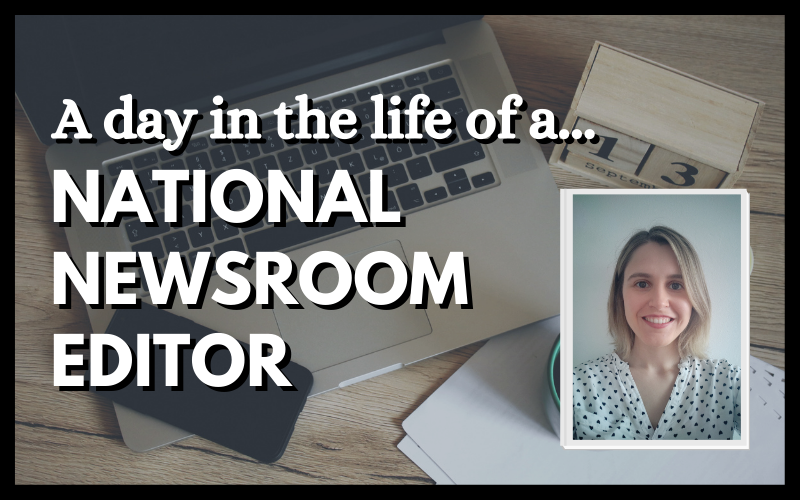National newsroom editor Abbie Llewelyn shared her experience of covering national stories and developing her journalism career.
As special projects editor at Express Online, Abbie leads a research-based news team focusing on exclusives and investigations. She has also done freelance work for The Telegraph, VICE and Citywire.
At our online guest talk for aspiring journalists, she described her career journey and gave loads of advice for anyone wanting to break into the industry.
How did you get started?
It all started when I began writing for my university student newspaper and liked it more than my actual degree.
After university I became a staff writer at a think tank and then I did the NCTJ fast-track course at News Associates in London.
Shortly after I started at the Express working overnight. It was a baptism of fire – the overnight shift was all relatively inexperienced people and it meant you were very quickly taking on more responsibilities.
Then I joined the special projects team. After a year I was asked to be their royal reporter and I really got into that niche before getting my current role as a newsroom editor.
Fascinating hour listening to @Abbie_Llewelyn talk about life as Special Projects Editor at the @Daily_Express. Lots of helpful tips, brilliant insight and motivation – once again showing one enters journalism for the passion & belief in change. Thanks to Abbie & @NewsAssociates!
— Noah Keate (@NoahKeate) February 16, 2022
What does an average day look like?
I’ll look at the latest news and draw up some news lists for what the reporters will be working on that day.
Then I’ll start writing and planning for what’s happening that week, spend some time subbing copy and look at the home page to see what should go where, while keeping an eye on what’s happening throughout the day.
What is it like managing a team?
The number one thing for leading my team is being empathetic and working with people.
I send several pars when sending back copy because people improve so much more when they are given encouragement and feedback on how to improve.
💻 NEW BLOG 💻
Last week, we hosted a panel on how to become a social media journalist 💡
In case you missed it, here is everything you need to know! ⬇️@chandnisembhi @Neve_GF @thompsonwillrj @IAmHelenThomas https://t.co/9tPH2UkIsw— School of Journalism (@TheJournoSchool) November 1, 2021
What advice do you have for freelancing?
One of the biggest mistakes people make when trying to go freelance is sending the same pitch to different publications. You have to be quite specific.
Think about the publication or broadcaster you’re writing to, what kind of things do they cover and why would they be interested in your story, show them you know their brand.
Show them why you’re the one who should write it. Having a niche means it’s much easier to find freelance stuff.
Where do you find stories and sources?
We get tip-offs when we are in the office, and I get a lot of people emailing me.
You can also get expert comment. To report the Russia/Ukraine conflict, we’re talking to Russian foreign policy experts, NATO officials and going through the data. From them you get an idea of the wider implication on the UK and the world.
Joe Biden @POTUS last night warned Vladimir Putin he and Russia will suffer the consequences for the #Ukraine war: https://t.co/2MqFNCvuJF (via @WhiteHouse) pic.twitter.com/fWDSRB3phL
— Daily Express (@Daily_Express) February 25, 2022
How do you separate work life from personal life?
News is 24/7 and even now as a national newsroom editor I rarely clock off on time, but there is a joy and thrill to being the first to break a story.
You have to be prepared to put in a few years of grunt work before you are in a position to be more picky.
What is your advice for aspiring and early-career journalists?
Get as much experience as you can, whether it’s a student newspaper or pitching freelance stuff. Build up your portfolio so you can send editors links to work you are proud of.
Be realistic, it is a tough industry. Don’t be narrow-minded about where you could work, don’t knock anywhere before you’ve tried it!
Quite a few places wouldn’t hire someone without formal training. For me doing an NCTJ course was invaluable because it was more hands-on and practical than doing a Master’s.
View this post on Instagram
What were your biggest takeaways from journalism training?
The essential journalism module where they teach you to write a news article was so important. It really hammered into me getting the most essential information in there and writing simply and accessibly
Media law is so important, it surrounds everything we’re doing. At a national so many people are going to be reading it who want to sue you.
I like to hire people who know about media law, IPSO, public affairs and how the country is run.
Whether you want to be a national newsroom editor, a sports reporter or a TV news presenter, check out our top takeaways from our panel event about different routes into journalism.

